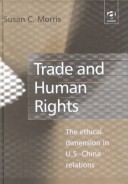Routledge Revivals
1 total work
Amid the globalization of markets and the interdependence of states, human rights violations throughout the world still persist. This book aims to establish a relationship between the economic interdependence of nations and the moral responsbilities of nations by examining the case of the 1994 decision by the Clinton administration to sever the ties between China's human rights practices and most-favoured-nation status. The 1994 decision is regarded as being a particularly significant one because it represents a decisive change in how human rights are - and will be - addressed in US foreign policy. It brings to the fore both the conflicting and the complementary issues of states' moral responsibilities to the protection of human rights and states' economic interests. In addition to closely examining the US-China relationship within the context of the 1994 decision, the book has a broader objective - to provide some insights into the state of human rights throughout the world as the start of the 21st century and to offer some policy options that can advance the cause of human rights not only in China but in every country where human rights violations are found.
